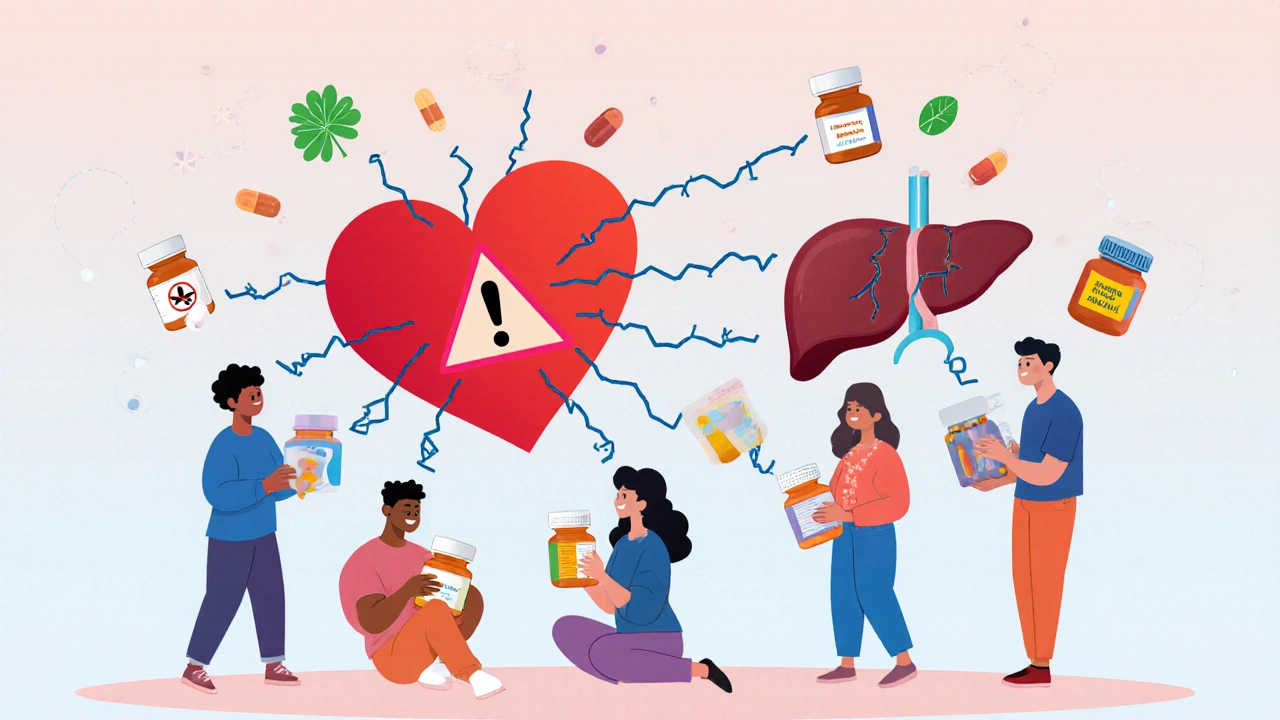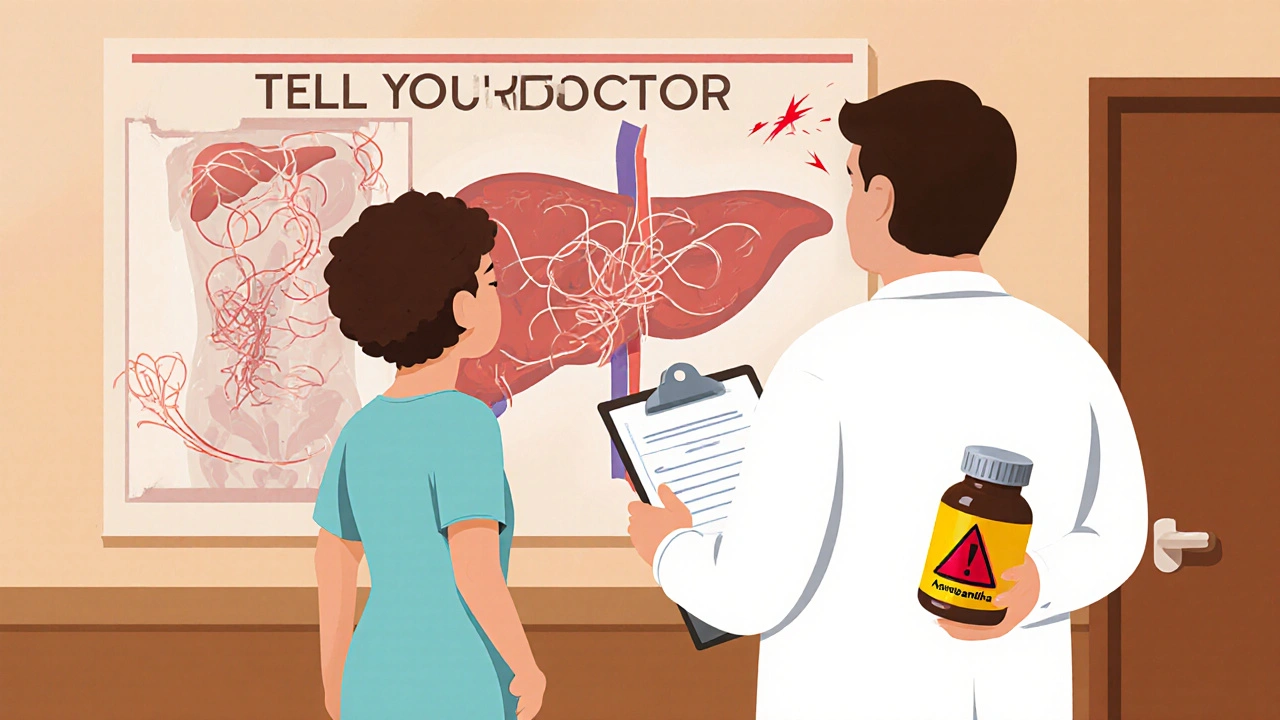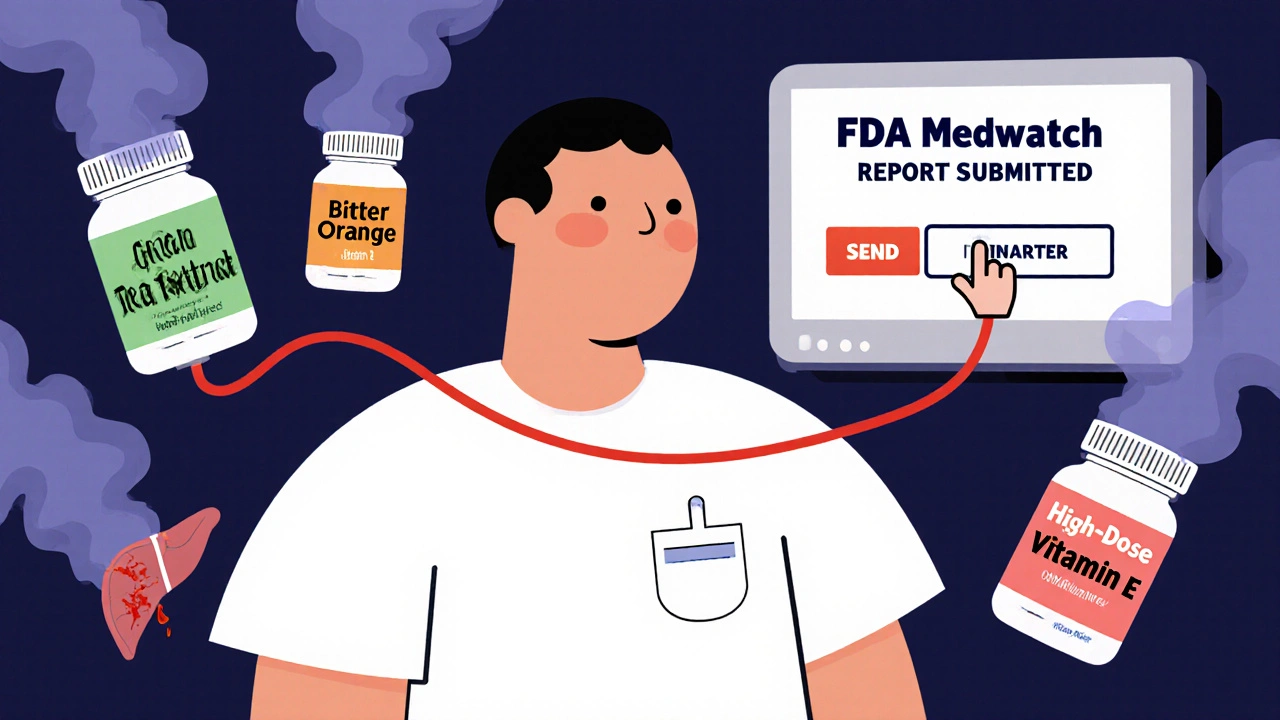Risks Associated with Any Medication or Dietary Supplement: What You Need to Know Before Taking Anything
 Nov, 26 2025
Nov, 26 2025
People assume that if something is natural, it’s safe. That’s a dangerous myth. Medication risks and dietary supplement dangers are real, often hidden, and sometimes life-threatening. You don’t need to be a doctor to understand them-you just need to know what to look for.
Supplements Aren’t Regulated Like Drugs
Dietary supplements are treated like food, not medicine. Under the Dietary Supplement Health and Education Act (DSHEA) of 1994, companies don’t have to prove their products work or are safe before selling them. The FDA can only step in after someone gets hurt. That means thousands of products hit the market with no real safety testing. In 2022, the FDA received over 5,000 reports of adverse events from supplements-and that’s just what got reported. Experts estimate less than 1% of actual incidents are ever reported.Compare that to prescription drugs. Before a pill gets approved, it goes through years of clinical trials, involving thousands of people. Supplements? One person tries it, feels fine, and the company puts it on the shelf. No follow-up required.
Herbs Can Be Just as Powerful as Prescription Drugs
St. John’s wort, ginkgo biloba, goldenseal, ashwagandha-these sound like harmless plant extracts. But they’re not. They contain powerful chemicals that interact with your body the same way pharmaceuticals do.St. John’s wort, for example, can slash the effectiveness of birth control pills by 13-15%. It can drop cyclosporine levels-used after organ transplants-by half. That’s not a minor side effect. That’s transplant rejection risk. It can also trigger serotonin syndrome when mixed with antidepressants like sertraline. One case reported to the FDA involved a 45-year-old man who ended up in the ER with confusion, shaking, and a racing heart after combining the two.
Goldenseal and Asian ginseng alter how your liver breaks down drugs. They can make blood pressure meds, statins, chemotherapy, and HIV treatments less effective-or more toxic. A 2017 study from the American Academy of Family Physicians found consistent, repeatable evidence of these interactions. Yet most people don’t tell their doctors they’re taking them.
High-Dose Vitamins Can Cause Real Harm
Vitamin A isn’t just for vision. Taking more than 10,000 IU a day over time can damage your liver, cause bone pain, and lead to vision loss. Acute overdose-over 300,000 IU at once-can trigger severe headaches, dizziness, and even coma.Vitamin D sounds harmless, right? Wrong. High-dose supplements (over 300,000 IU per month) increase fall and fracture risk in older adults by 15-20%. Why? Because too much vitamin D floods your blood with calcium. That can lead to kidney stones, heart rhythm problems, and even calcification of arteries.
Vitamin E at doses above 400 IU per day increases bleeding risk. One Australian study showed a 10% higher chance of hemorrhagic stroke. And if you’re on blood thinners like warfarin? That risk spikes.

Supplements and Blood Thinners: A Deadly Mix
Ginkgo biloba, garlic, fish oil, and even high-dose vitamin E all thin your blood. They don’t just make you bleed more easily-they can cause internal bleeding that’s hard to detect until it’s too late.A 68-year-old woman in Florida was hospitalized after combining ginkgo biloba with daily aspirin. She developed massive gastrointestinal bleeding. Her doctor said if she’d waited another day, she might not have made it. That case was reported to the FDA in March 2022.
Even “natural” products like ginger and turmeric can interfere with clotting. And if you’re scheduled for surgery? Many anesthesiologists now require patients to stop all supplements at least two weeks before the procedure. Why? Because uncontrolled bleeding during surgery can be fatal.
Supplements Can Ruin Cancer Treatment
If you’re undergoing chemotherapy or radiation, your body is already under extreme stress. Supplements can make it worse.Antioxidants like vitamins C and E are marketed as “detoxifiers,” but they can interfere with how chemotherapy kills cancer cells. The American Cancer Society says these supplements can reduce treatment effectiveness by 25-30% in some cases. One patient, a breast cancer survivor, told Reddit her radiation oncologist made her stop all supplements after her skin blistered during treatment-likely from vitamin E.
Vitamin K is another silent saboteur. It directly counteracts warfarin, a common blood thinner. A single high-dose supplement can drop warfarin’s effect by 40-50%, putting you at risk for stroke or pulmonary embolism. Many patients don’t realize this until they’re back in the hospital.
What You’re Not Telling Your Doctor Is Hurting You
Fifty percent of American adults take dietary supplements. Only 33% tell their doctor. That’s a massive gap.Doctors can’t protect you from interactions if they don’t know what you’re taking. A 2022 study showed 67% of dangerous drug-supplement interactions happen because patients didn’t disclose supplement use. That’s not negligence-it’s misinformation. People think, “It’s just a vitamin,” or “My pharmacist said it’s fine.”
Here’s what you should do: Bring a written list of everything you take-prescription meds, over-the-counter drugs, herbs, vitamins, minerals, probiotics-to every appointment. Use the NIH’s free “My Dietary Supplement and Medicine Record” tool. It’s used by over 1,200 clinics nationwide. Write down the name, dose, and how often you take it. Update it every time something changes.

Online Supplements Are a Wild West
Forty-five percent of supplement-related adverse events come from products bought online. Why? Because regulation is almost nonexistent. Many products contain hidden ingredients-synthetic stimulants, steroids, or even prescription drugs-labeled as “natural.”The FDA’s Dietary Supplement Ingredient Advisory List now flags 12 high-risk ingredients, including bitter orange and yohimbe. Bitter orange can raise blood pressure by 10-15 mmHg and cause irregular heartbeat. One Reddit user reported severe insomnia and heart palpitations after taking 500mg of ashwagandha with their blood pressure medication. That’s not coincidence-it’s chemistry.
Green tea extract, sold as a “fat burner,” is now linked to over 20% of supplement-related liver injuries. LiverTox, a database run by the NIH, lists 45 supplements that can damage your liver. Most people don’t know their liver is under attack until it’s too late.
What to Do If You Think You’re Having a Reaction
Symptoms to watch for:- Rashes or skin reactions
- Shortness of breath
- Diarrhea or vomiting
- Severe joint or muscle pain
- Slurred speech or confusion
- Blood in urine or stool
- Heart palpitations or chest pain
If you notice any of these after starting a new supplement, stop it immediately. Call your doctor. If it’s severe-like chest pain, trouble breathing, or loss of consciousness-go to the ER.
Report it to the FDA. Use their MedWatch Online system. In 2022, they received over 18,000 supplement-related reports. Every report helps them track dangerous products. Your report could save someone else’s life.
The Bottom Line
There’s no such thing as a “risk-free” supplement. Every pill, powder, or capsule you take has biological effects. Some are helpful. Others are dangerous. And most are unknown.Don’t assume safety because something is labeled “natural.” Don’t trust marketing claims. Don’t rely on your pharmacist’s offhand advice. Ask your doctor. Show them your list. Ask: “Could this interact with my meds? Could it hurt me?”
Medication risks aren’t just about pills you get from a pharmacy. They’re about what you take on top of them. And that’s something you can control.
Are dietary supplements safer than prescription drugs?
No. Prescription drugs go through years of testing for safety and effectiveness before approval. Supplements are not required to prove safety or effectiveness before being sold. The FDA only steps in after harm occurs, which means dangerous products can stay on shelves for months or years.
Can I take supplements while on blood thinners?
Some can be dangerous. Ginkgo biloba, garlic, fish oil, vitamin E, and even high-dose vitamin C can increase bleeding risk when taken with warfarin or aspirin. Always check with your doctor before combining any supplement with blood thinners.
Do multivitamins have risks?
Yes. While most people don’t overdose on standard multivitamins, high-dose versions or combining them with other supplements can lead to toxicity. Excess vitamin A, D, or iron can damage organs. Some multivitamins contain hidden ingredients or exceed safe limits. Stick to reputable brands and avoid megadoses unless prescribed.
Why do so many supplement reactions happen during cancer treatment?
Cancer treatments like chemotherapy and radiation target rapidly dividing cells. Antioxidants in supplements like vitamins C and E can interfere with this process, reducing treatment effectiveness. Some supplements also stress the liver, which is already working hard to process chemo drugs. Oncologists often recommend stopping all supplements during treatment unless specifically approved.
How do I know if a supplement is safe?
There’s no guaranteed way. Look for third-party testing seals like USP, NSF, or ConsumerLab, but even these don’t guarantee safety with medications. The safest approach is to avoid supplements unless recommended by a doctor who knows your full medical history and current medications.
Should I stop all supplements before surgery?
Yes. Most surgeons and anesthesiologists recommend stopping all supplements at least two weeks before surgery. Many can interfere with bleeding, blood pressure, or anesthesia. Don’t assume something is safe just because it’s “natural.”
Can supplements cause liver damage?
Yes. Green tea extract, weight-loss supplements, and some herbal products like kava and comfrey are linked to liver injury. The NIH’s LiverTox database lists 45 supplement ingredients associated with liver damage. Symptoms include yellow skin, dark urine, fatigue, and abdominal pain. If you suspect liver damage, stop the supplement and see a doctor immediately.
Is it safe to buy supplements online?
It’s risky. Nearly half of all supplement-related adverse events come from online purchases. Many products contain hidden drugs, heavy metals, or unapproved stimulants. Stick to reputable retailers and avoid products that promise “miracle” results or claim to be “FDA-approved” (they’re not).
If you’re taking any medication-even something as simple as high blood pressure pills or antidepressants-your supplement choices matter. Not every herb is harmless. Not every vitamin is safe. Your body doesn’t distinguish between a pill from a pharmacy and one from a health store. It only responds to what’s in it.
Melania Rubio Moreno
November 26, 2025 AT 21:05Rhiana Grob
November 27, 2025 AT 02:40Frances Melendez
November 28, 2025 AT 01:15Jonah Thunderbolt
November 29, 2025 AT 22:11Rebecca Price
November 30, 2025 AT 12:35shawn monroe
December 1, 2025 AT 07:00marie HUREL
December 3, 2025 AT 05:25Lauren Zableckis
December 3, 2025 AT 06:24Asha Jijen
December 4, 2025 AT 04:00Edward Batchelder
December 4, 2025 AT 04:47reshmi mahi
December 5, 2025 AT 21:23laura lauraa
December 5, 2025 AT 22:41